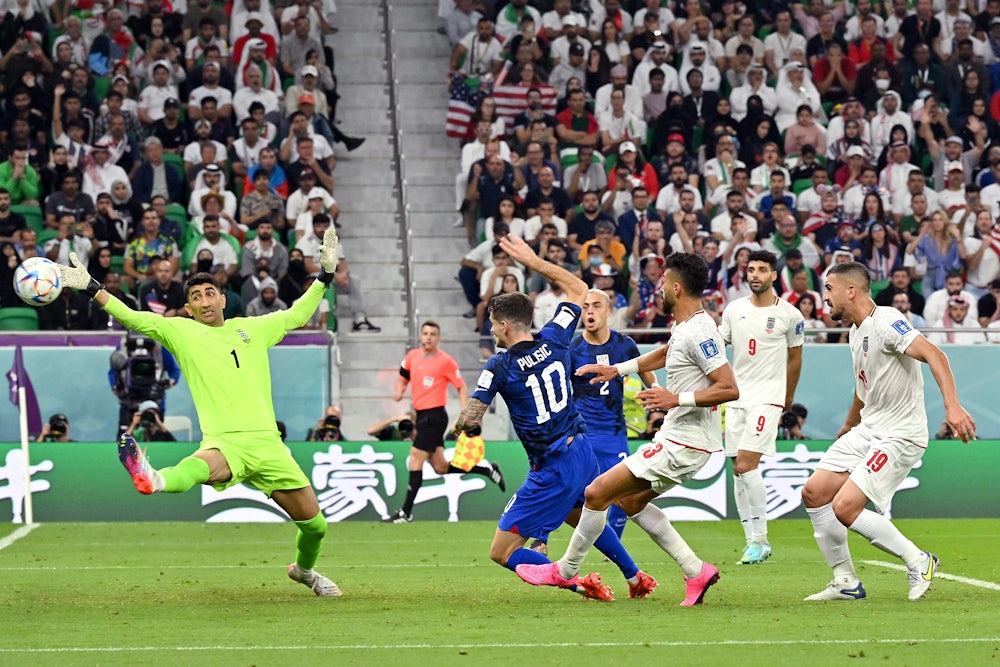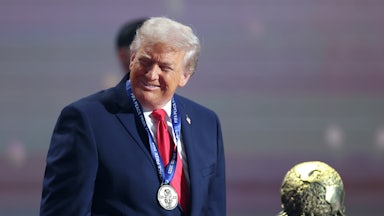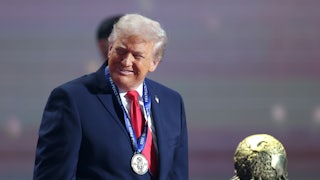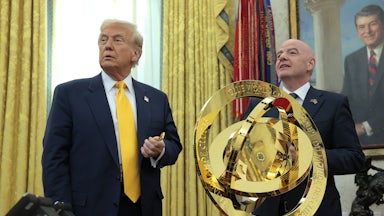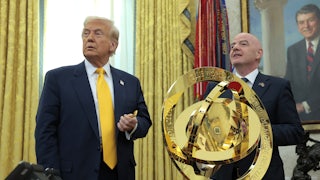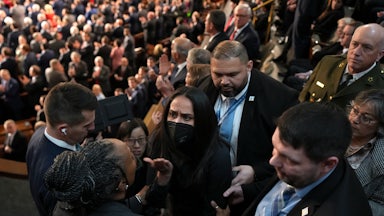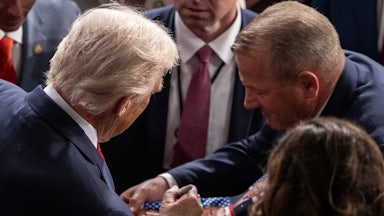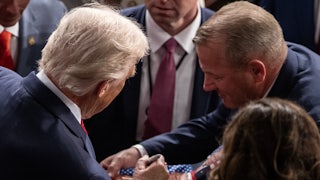There have certainly been prettier goals. Brazil has produced two far superior ones—two perfectly Brazilian screamers—in one less game. United States winger Tim Weah produced one on Tuesday—swiftly disallowed by an automated offside call, the margins of which were somewhere between a whisker and a speck of dust—that felt like a perfect image of the type his father used to score for Monaco and Milan. But the Americans’ first and only goal against Iran, scored by Cristian Pulisic, was perfect in the way it encapsulated this team at this moment.
Can't stop watching Pulisic's goal 🇺🇸🤩🔂@USMNT pic.twitter.com/zhFZPvSgLa
— FOX Soccer (@FOXSoccer) November 29, 2022
It wasn’t devoid of beauty: Weston McKennie, a rangy box-to-box midfielder with a bevy of skills that have long eluded American eights, plays a perfect one-touch, 20-yard cross-field pass to Sergiño Dest—a fullback playing well higher (and, as a regular at Milan on loan from Barcelona, at a much higher level) than American players are used to. Dest, rushing toward the six-yard box, played an inch-perfect header to Pulisic, the team’s talisman. Running at full speed at the goal, Pulisic didn’t so much play the ball Dest offered as he did crash into it—and the goalkeeper. The U.S. team and its fans erupted in joy; Pulisic was in agony. He would go out at halftime with one of the sport’s great euphemisms: an “abdominal” injury (he was, to be fair, hit in the midsection).
The goal was golden: The U.S. is headed to the round of 16, where it will meet the Netherlands. But it was also so perfectly messy—capturing everything this young, plucky USMNT is in this moment.
For years, the U.S. has agonized over its preferred style of play. The U.S. was physical. The U.S. had grit. It was an underdog—lovable to some—but there was a bunker mentality that seemed to stem both from insecurity and isolation. When former German superstar Jürgen Klinsman showed up in 2012 to take over the team, he had a distinct Music Man feel: There was a promise not just to bring modernity to this team but to make them European. Klinsman, after all, had put Brockway, Ogdenville, and North Haverbrook on the map. (OK, I haven’t seen the Music Man, only the Simpsons parody.)
It didn’t take. Klinsman’s teams grew more and more defensive; his tenure went from promise to calamity—the USMNT failed to qualify for the 2018 World Cup. Some teams are destined to play a certain way: Brazil, the Netherlands, Italy, Uruguay. Add the U.S. to the list.
What was so beautiful about Pulisic’s goal is that it possessed the stuff of the team’s past and its present. Few U.S. players have ever had McKennie’s talent. And while the jury is still out on Dest, he is, nevertheless, a very modern, very un-American type of attacking fullback. (On the other wing, there is another like him, Fulham’s Antonee Robinson, who similarly oscillates from promise to peril.) This American team is the second-youngest in the tournament but—by far—the most skilled in USMNT history. Somehow, it has managed to blend the talent that has brought its members to top teams like Chelsea and Juventus—and decent sides such as Lille and Leeds and Fulham—with the type of pluckiness that defined the team for decades. Against England, this American team was the better in a 0–0 draw. It controlled the game by outthinking the more talented English—who didn’t change their tactics from their prior game against Iran—and then outworking them.
I am, I must confess, a dyed-in-the-wool USMNT hater. Despite a lifetime of rooting for abject (or near abject) teams—the New York Knicks, the Oakland A’s, the Buffalo Bills—there was always something cringey about rooting for the USMNT. Even at their most goonish, the players always seemed somewhat hapless; in a global showcase, even when they succeeded there was something pathetic about them. The defining American goal for me isn’t the USMNT’s most famous—Landon Donovan’s stoppage time winner against Algeria in 2010 (What does it say when your team’s most famous modern goal is against Algeria?)—but Clint Dempsey’s tying one against England in the same tournament. In that game, with time ticking down in the first half and England up 1–0, America’s greatest player took a speculative shot with his weak foot from 25 yards out. It was hit awkwardly and bounced goofily—and then bobbled its way, Buckner-like, through England goalie Rob Green’s arms. It was a stupid goal. And in its own way, a very American one.
But sometime during the first half of the USMNT’s game against Wales, I realized this was an American team I could love. Its players are a patchwork quilt of old and new. Defensively, the team plays with the determination and energy—and, at times, abjectness—of the U.S. teams of old. It features several players about whom one of soccer’s great, fatalistic clichés—“He has a mistake in him”—applies. Its midfield—a trio of destroyer Tyler Adams, the do-it-all McKennie, and the zippy Yunus Musah, who has the making of an extraordinary attacking player—is unlike any Americans who have played before. And its attacking frontline, led by Pulisic, is all zip and energy; when Leeds’s Brendan Aaronson comes on, they’re downright combustible. All this has happened without one of the team’s best players, Borussia Dortmund midfielder Gio Reyna, whose absence from the starting lineup has been something of a mystery.
The players don’t always accomplish what they set out to do (they’ve notably struggled to simply finish their attacks with a dose of cutting edge throughout the group stage), but they’re always doing something and the something they are doing looks incredibly like soccer. Even in a robust performance in what was, at times, a boring draw against England, it was the U.S. that gave more kinetic energy.
The U.S. men’s national team is not going to win the World Cup. It’s too young and inexperienced; the team’s coach, Gregg Berhalter, has struggled to make the right adjustments and close out games. Making it to the knockout stage feels like this team’s ceiling, even though the quarterfinals are reachable. The Dutch team that it will face on Saturday lacks a reliable goal scorer—though Cody Gakpo has been one of the tournament’s breakout stars—and frequently looks ropy. But it remains the Netherlands, and we remain the U.S. Still, for the first time, this team feels like it’s actually building something instead of standing still. For years, the team alternated between quirky success and flop-sweat failure, never really seeming to make much progress between major tournaments. There was always the sense that the U.S. was not, deep down, a real soccer country. This team is untroubled by that anxiety. It is untroubled by being too defensive or too European. It just plays, and it plays well. So far, so good.
